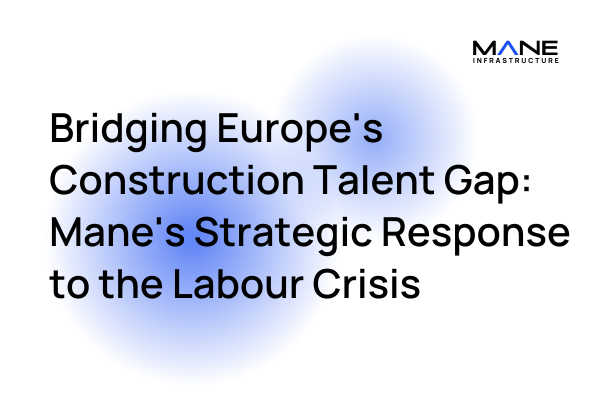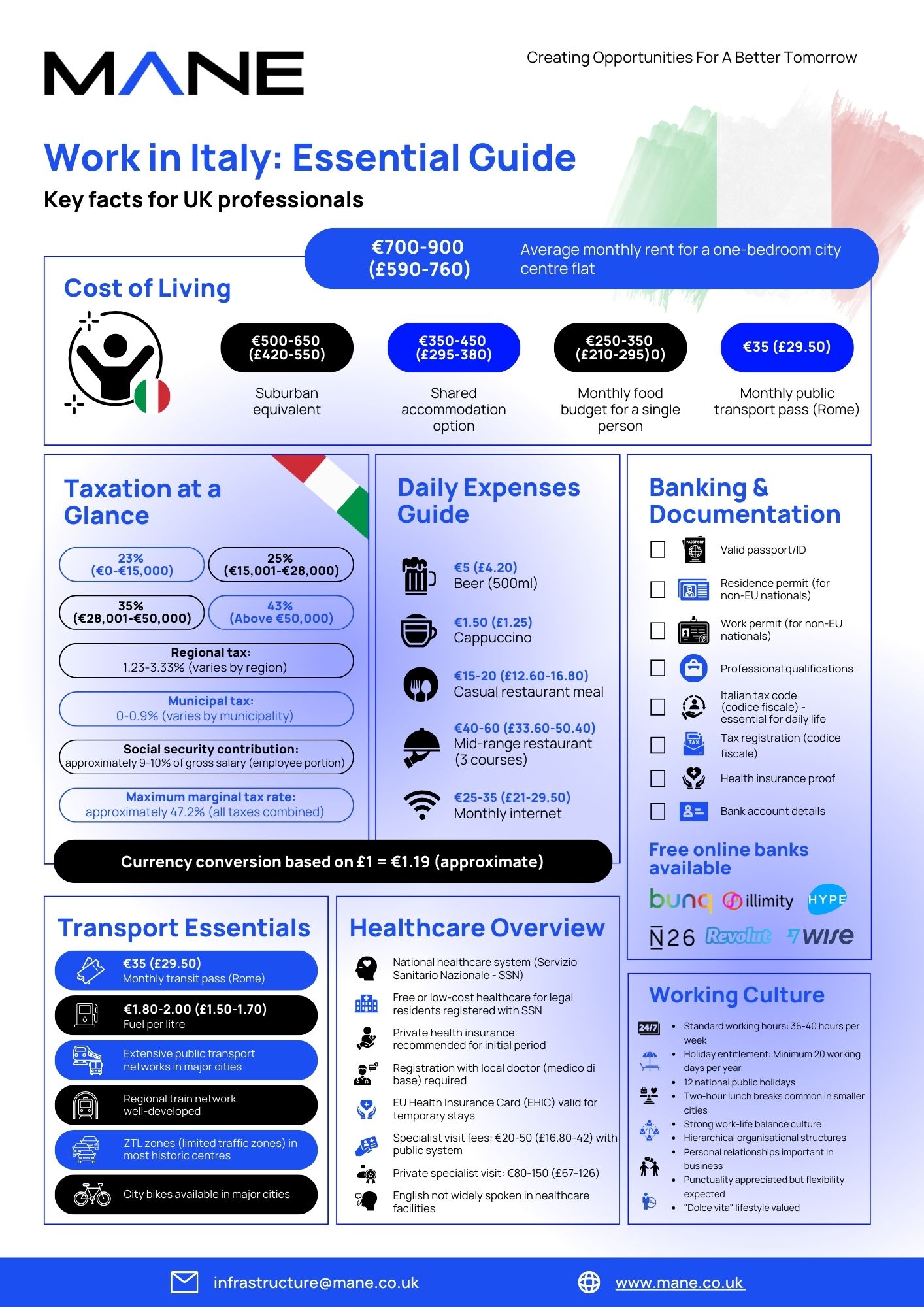Bridging Europe's Construction Talent Gap: Mane's Strategic Response to the Labour Crisis
08 Jan, 20252minsEurope's construction sector faces critical workforce shortages as demand surges across hype...

Europe's construction sector faces critical workforce shortages as demand surges across hyperscale data centres, pharmaceutical facilities, and renewable energy projects. According to the European Federation of Engineering Consultancy Associations (EFCA), labour scarcity is now limiting growth in 31% of construction and service sector cases across the EU. With major infrastructure modernisation programmes underway, this shortage of skilled workers poses a significant challenge to the industry's ability to deliver essential projects.
The Scale of the Challenge
The construction industry faces a dual challenge: an immediate need for skilled workers and a long-term requirement for workforce development. By 2030, the sector will require more than two million additional workers, with specialised projects demanding increasingly complex skill sets. This figure comprises approximately 1.5 million additional workers needed for new projects and 1.2 million to replace an ageing workforce leaving the sector. The German market alone reported 52,000 vacancies in 2023, with actual numbers estimated to be significantly higher according to Bau Industrie, the German construction industry association.
The retention of skilled workers presents an equally pressing challenge. According to Riccardo Viaggi, Secretary General at the Committee for European Construction Equipment (CECE), the industry's traditional reliance on migrant workers is proving insufficient. "Many countries, including Western Europe and Europe in general, rely on immigration to maintain their workforce," he explains. "Although it can be a sensitive topic politically, it is a recognised and necessary aspect of the workforce mix. However, once these people learn the language, they tend to leave the sector."
The Technology and Skills Evolution
The construction sector is undergoing a fundamental transformation, driven by the triple imperatives of digitalisation, sustainability, and efficiency. This evolution demands new approaches to training and skills development. Lena Guyon, Policy Officer for Social Affairs at FIEC (European Construction Industry Federation), emphasises the need for coordinated action: "There is a need for not only companies but also the government and educational system to work together to improve training centres. Teachers should also be trained to use new technologies to ensure that students receive the proper training."
Industry experts increasingly recognise that the solution must go beyond traditional recruitment methods. Karen Plumbley-Jones, Managing Partner at law firm Womble Bond Dickinson, advocates for a comprehensive approach: "Governments and education institutions need to collaborate, encourage developing the skill sets needed for the future of construction – including robotics, materials innovation, green technology, data expertise, smart cities and more."
Critical Sectors Under Pressure
• Data Centres: The rapid expansion of cloud services and AI infrastructure has created unprecedented demand for specialised construction workers. European data centre floorspace is projected to exceed 10 million square feet in 2025, nearly double the 2015 capacity. This growth is driven by increasing digital transformation and the emergence of AI technologies, requiring workers with expertise in both construction and technical infrastructure. Recent reports highlight that data centre "take up" in London alone will be almost triple that of 2019 by 2025, according to real estate services firm CBRE. The sector faces unique challenges in finding workers who can handle the precise requirements of data centre construction, from specialised electrical work to critical systems installation.
• Pharmaceutical Facilities: The post-pandemic push for European pharmaceutical manufacturing independence has accelerated facility construction, requiring workers with specialised clean-room and GMP-compliant building expertise. The sector demands exceptional attention to detail and understanding of regulatory requirements, creating a niche but critical skills gap. The construction of these facilities requires workers who understand both traditional construction methods and the specific requirements of pharmaceutical manufacturing environments, including air handling systems, containment solutions, and sterile manufacturing spaces.
• Renewable Energy Projects: The EU's aggressive clean energy targets are driving massive infrastructure development, demanding workers skilled in both traditional construction and emerging green technologies. This sector faces particular challenges as it requires workers to combine conventional construction skills with knowledge of sustainable building practices and renewable energy systems. The expansion of wind farms, solar installations, and energy storage facilities has created a new category of construction specialist who must understand both structural engineering principles and renewable energy technologies.
Mane's Strategic Solution
As a leading technical recruitment specialist, Mane is uniquely positioned to address these challenges through our comprehensive European talent deployment strategy:
Cross-Border Talent Mobility
We leverage our extensive European network to facilitate the movement of skilled workers across borders, ensuring critical projects maintain momentum despite local labour shortages. Our deep understanding of EU labour regulations and cross-border employment requirements enables seamless workforce deployment.
Specialised Skill Development
Mane partners with clients to identify skill gaps and implement targeted training programmes, preparing workers for the specific demands of hyperscale projects. This approach ensures that workers are equipped with the exact competencies needed for success in specialised construction environments.
Strategic Workforce Planning
Our data-driven approach to workforce planning helps clients anticipate labour needs and develop proactive recruitment strategies. This includes:
• Early engagement with project stakeholders to identify specific skill requirements
• Development of talent pipelines aligned with project timelines
• Implementation of retention strategies to maintain workforce stability
Innovation in Recruitment
Mane employs innovative recruitment methodologies to attract new talent to the construction sector, including:
• Targeted outreach to adjacent industries with transferable skills
• Strategic use of digital platforms and AI-powered recruitment tools to identify and engage passive candidates
• Advice on the development of apprenticeship and training programmes in partnership with clients
• Implementation of diversity initiatives to expand the available talent pool, including partnerships with women in construction networks and implementation of inclusive recruitment practices including unconscious bias training
• Development of multilingual recruitment teams to enhance communication and collaboration
The Path Forward
The construction labour crisis requires a coordinated response from all industry stakeholders. Mane's comprehensive approach to talent acquisition and deployment provides a crucial bridge between available talent and project needs. By combining our deep industry knowledge with innovative recruitment strategies, we enable clients to maintain project momentum despite the challenging labour market.
Taking Action
For organisations facing construction workforce challenges, Mane offers:
• Comprehensive workforce planning and deployment solutions
• Access to pre-vetted, specialised construction talent
• Strategic advice on talent retention and development
As Europe's construction sector continues to evolve, Mane remains committed to providing the expertise and resources needed to overcome the current labour crisis and build a sustainable workforce for the future.
________________________________________
Contact Mane today to learn how we can help address your construction workforce needs and ensure your projects stay on track in this challenging labour market.


